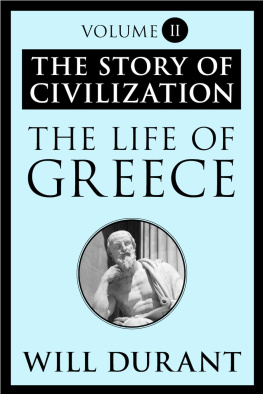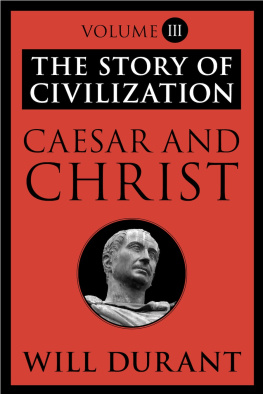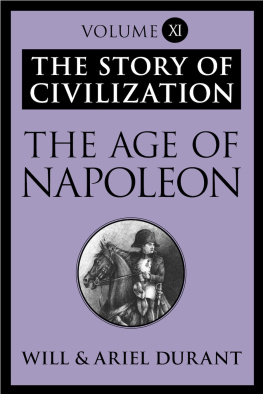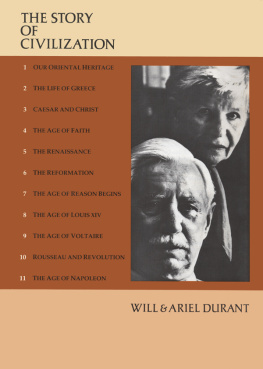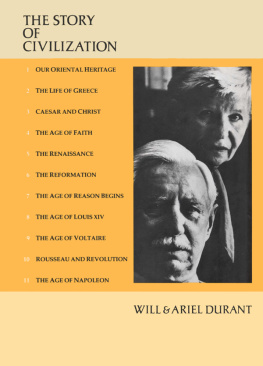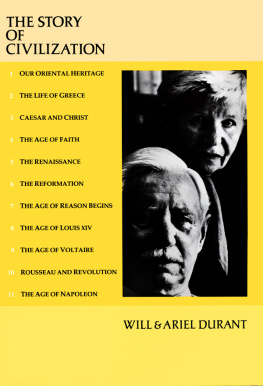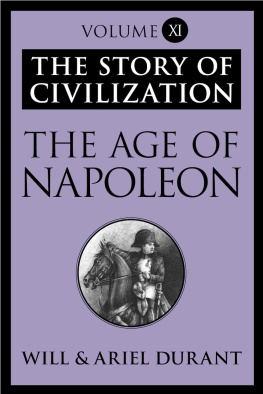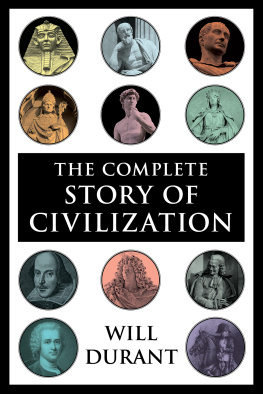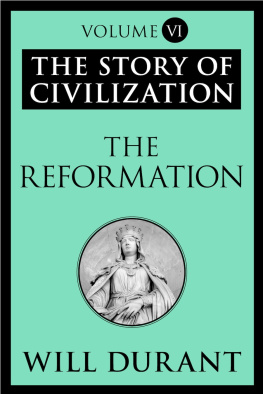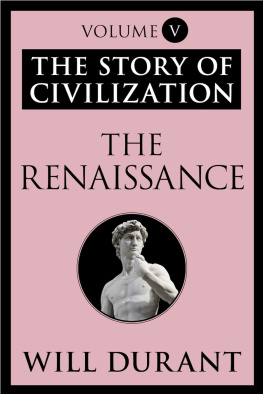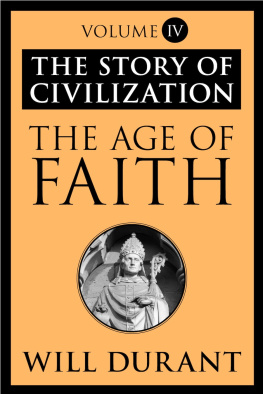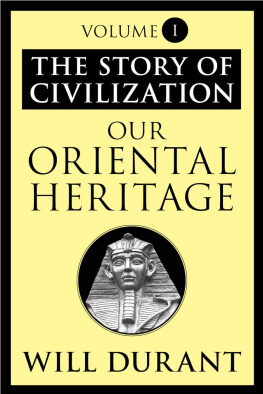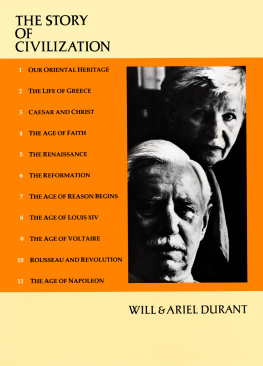Will Durant - The Story of Civilization Volume II: The Life of Greece
Here you can read online Will Durant - The Story of Civilization Volume II: The Life of Greece full text of the book (entire story) in english for free. Download pdf and epub, get meaning, cover and reviews about this ebook. year: 0, publisher: Simon & Schuster, genre: History. Description of the work, (preface) as well as reviews are available. Best literature library LitArk.com created for fans of good reading and offers a wide selection of genres:
Romance novel
Science fiction
Adventure
Detective
Science
History
Home and family
Prose
Art
Politics
Computer
Non-fiction
Religion
Business
Children
Humor
Choose a favorite category and find really read worthwhile books. Enjoy immersion in the world of imagination, feel the emotions of the characters or learn something new for yourself, make an fascinating discovery.
- Book:The Story of Civilization Volume II: The Life of Greece
- Author:
- Publisher:Simon & Schuster
- Genre:
- Year:0
- Rating:5 / 5
- Favourites:Add to favourites
- Your mark:
- 100
- 1
- 2
- 3
- 4
- 5
The Story of Civilization Volume II: The Life of Greece: summary, description and annotation
We offer to read an annotation, description, summary or preface (depends on what the author of the book "The Story of Civilization Volume II: The Life of Greece" wrote himself). If you haven't found the necessary information about the book — write in the comments, we will try to find it.
The Story of Civilization Volume II: The Life of Greece — read online for free the complete book (whole text) full work
Below is the text of the book, divided by pages. System saving the place of the last page read, allows you to conveniently read the book "The Story of Civilization Volume II: The Life of Greece" online for free, without having to search again every time where you left off. Put a bookmark, and you can go to the page where you finished reading at any time.
Font size:
Interval:
Bookmark:

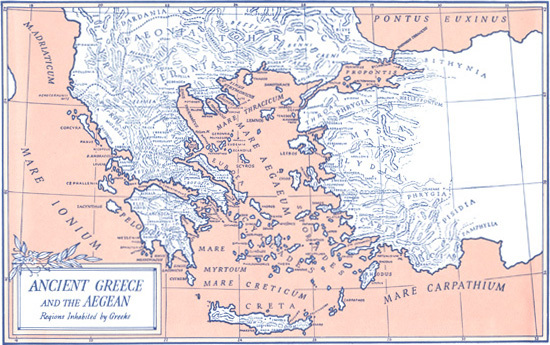
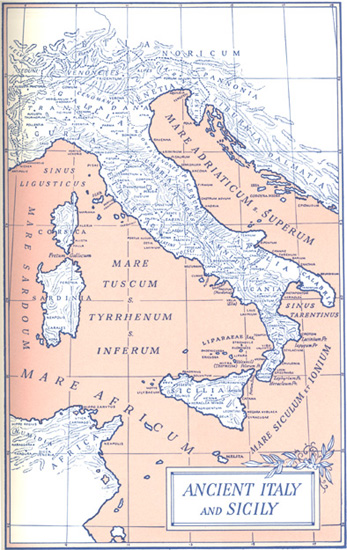

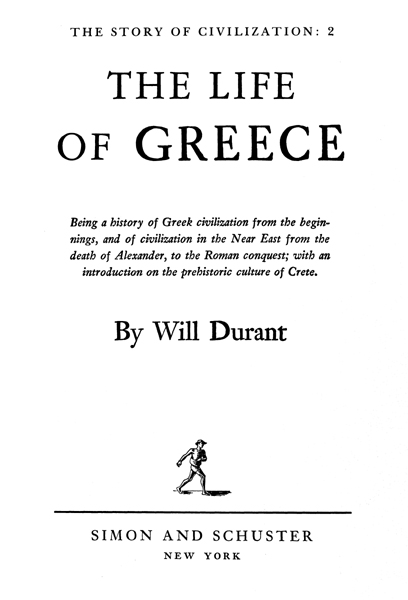
TO MY FRIEND
MAX SCHOTT
M Y purpose is to record and contemplate the origin, growth, maturity, and decline of Greek civilization from the oldest remains of Crete and Troy to the conquest of Greece by Rome. I wish to see and feel this complex culture not only in the subtle and impersonal rhythm of its rise and fall, but in the rich variety of its vital elements: its ways of drawing a living from the land, and of organizing industry and trade; its experiments with monarchy, aristocracy, democracy, dictatorship, and revolution; its manners and morals, its religious practices and beliefs; its education of children, and its regulation of the sexes and the family; its homes and temples, markets and theaters and athletic fields; its poetry and drama, its painting, sculpture, architecture, and music; its sciences and inventions, its superstitions and philosophies. I wish to see and feel these elements not in their theoretical and scholastic isolation, but in their living interplay as the simultaneous movements of one great cultural organism, with a hundred organs and a hundred million cells, but with one body and one soul.
Excepting machinery, there is hardly anything secular in our culture that does not come from Greece. Schools, gymnasiums, arithmetic, geometry, history, rhetoric, physics, biology, anatomy, hygiene, therapy, cosmetics, poetry, music, tragedy, comedy, philosophy, theology, agnosticism, skepticism, stoicism, epicureanism, ethics, politics, idealism, philanthropy, cynicism, tyranny, plutocracy, democracy: these are all Greek words for cultural forms seldom originated, but in many cases first matured for good or evil by the abounding energy of the Greeks. All the problems that disturb us todaythe cutting down of forests and the erosion of the soil; the emancipation of woman and the limitation of the family; the conservatism of the established, and the experimentalism of the unplaced, in morals, music, and government; the corruptions of politics and the perversions of conduct; the conflict of religion and science, and the weakening of the supernatural supports of morality; the war of the classes, the nations, and the continents; the revolutions of the poor against the economically powerful rich, and of the rich against the politically powerful poor; the struggle between democracy and dictatorship, between individualism and communism, between the East and the Westall these agitated, as if for our instruction, the brilliant and turbulent life of ancient Hellas. There is nothing in Greek civilization that does not illuminate our own.
We shall try to see the life of Greece both in the mutual interplay of its cultural elements, and in the immense five-act drama of its rise and fall. We shall begin with Crete and its lately resurrected civilization, because apparently from Crete, as well as from Asia, came that prehistoric culture of Mycenae and Tiryns which slowly transformed the immigrating Achaeans and the invading Dorians into civilized Greeks; and we shall study for a moment the virile world of warriors and lovers, pirates and troubadours, that has come down to us on the rushing river of Homers verse. We shall watch the rise of Sparta and Athens under Lycurgus and Solon, and shall trace the colonizing spread of the fertile Greeks through all the isles of the Aegean, the coasts of Western Asia and the Black Sea, of Africa and Italy, Sicily, France, and Spain. We shall see democracy fighting for its life at Marathon, stimulated by its victory, organizing itself under Pericles, and flowering into the richest culture in history; we shall linger with pleasure over the spectacle of the human mind liberating itself from superstition, creating new sciences, rationalizing medicine, secularizing history, and reaching unprecedented peaks in poetry and drama, philosophy, oratory, history, and art; and we shall record with melancholy the suicidal end of the Golden Age in the Peloponnesian War. We shall contemplate the gallant effort of disordered Athens to recover from the blow of her defeat; even her decline will be illustrious with the genius of Plato and Aristotle, Apelles and Praxiteles, Philip and Demosthenes, Diogenes and Alexander. Then, in the wake of Alexanders generals, we shall see Greek civilization, too powerful for its little peninsula, bursting its narrow bounds, and overflowing again into Asia, Africa, and Italy; teaching the cult of the body and the intellect to the mystical Orient, reviving the glories of Egypt in Ptolemaic Alexandria, and enriching Rhodes with trade and art; developing geometry with Euclid at Alexandria and Archimedes at Syracuse; formulating in Zeno and Epicurus the most lasting philosophies in history; carving the Aphrodite of Melos, the Laocon, the Victory of Samothrace , and the Altar of Pergamum; striving and failing to organize its politics into honesty, unity, and peace; sinking ever deeper into the chaos of civil and class war; exhausted in soil and loins and spirit; surrendering to the autocracy, quietism, and mysticism of the Orient; and at last almost welcoming those conquering Romans through whom dying Greece would bequeath to Europe her sciences, her philosophies, her letters, and her arts as the living cultural basis of our modern world.
I am grateful to Mr. Wallace Brockway for his scholarly help at every stage of this work; to Miss Mary Kaufman, Miss Ethel Durant, and Mr. Louis Durant for aid in classifying the material; to Miss Regina Sands for her expert preparation of the manuscript; and to my wife for her patient encouragement and quiet inspiration.
I am deeply indebted to Sir Gilbert Murray and to his publishers, the Oxford University Press, for permission to quote from his translations of Greek drama. These translations have enriched English literature.
I am-also indebted to the Oxford University Press for permission to quote from its excellent Oxford Book of Greek Verse in Translation.
W. D.
1. This book, while forming the second part of the authors Story of Civilization, has been written as an independent unit, complete in itself. The next volume will probably appear in 1943 under the title of Caesar and Christ a history of Roman civilization and of early Christianity.
2. To bring the book into smaller compass, reduced type (like this) has been used for technical or recondite material. Indented passages in reduced type are quotations.
3. The raised numbers in the text refer to the Notes at the end of the volume. Hiatuses in the numbering of the notes are due to last minute curtailments.
4. The chronological table given at the beginning of each period is designed to free the text as far as possible from minor dates and royal trivialities. All dates are B.C. unless otherwise stated or evident.
5. The maps at the beginning and the end of the book show nearly all the places referred to in the text. The glossary defines all unfamiliar foreign words used, except when these are explained where they occur. The starred titles in the bibliography may serve as a guide to further reading. The index pronounces ancient names, and gives dates of birth and death where known.
Font size:
Interval:
Bookmark:
Similar books «The Story of Civilization Volume II: The Life of Greece»
Look at similar books to The Story of Civilization Volume II: The Life of Greece. We have selected literature similar in name and meaning in the hope of providing readers with more options to find new, interesting, not yet read works.
Discussion, reviews of the book The Story of Civilization Volume II: The Life of Greece and just readers' own opinions. Leave your comments, write what you think about the work, its meaning or the main characters. Specify what exactly you liked and what you didn't like, and why you think so.

